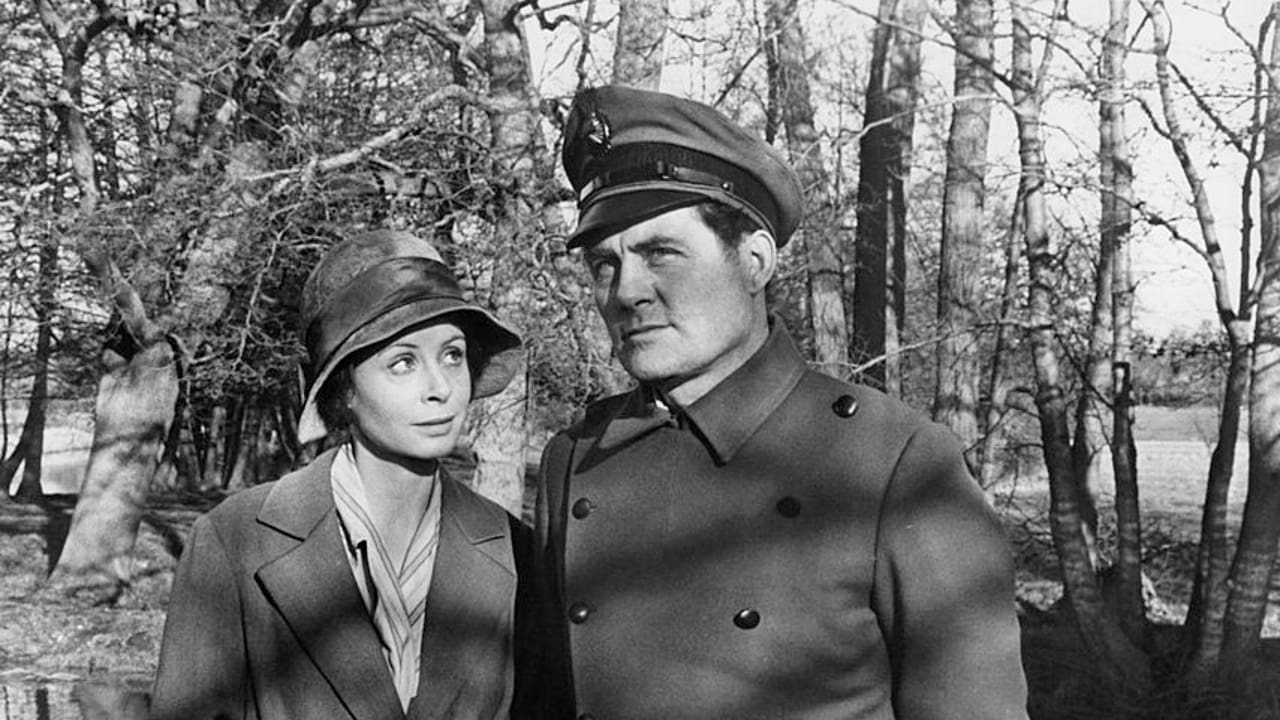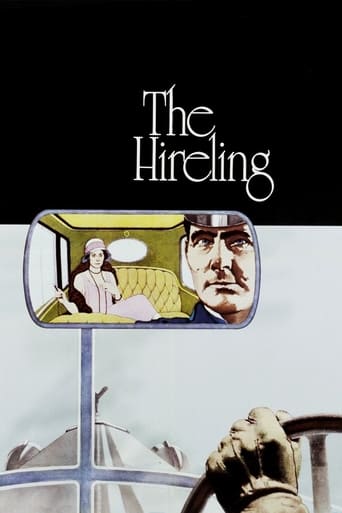

The biggest problem with this movie is it’s a little better than you think it might be, which somehow makes it worse. As in, it takes itself a bit too seriously, which makes most of the movie feel kind of dull.
... View MoreTrue to its essence, the characters remain on the same line and manage to entertain the viewer, each highlighting their own distinctive qualities or touches.
... View MoreThis is one of the best movies I’ve seen in a very long time. You have to go and see this on the big screen.
... View MoreThe film never slows down or bores, plunging from one harrowing sequence to the next.
... View MoreThe Hireling is directed by Alan Bridges, is based on the novel by L.P Hartley and stars Robert Shaw and Sarah Miles.Lady Franklin(Sarah Miles) is a young widow who after suffering a breakdown following the death of her husband, is released from hospital and returns home. Her new chauffeur Ledbetter(Robert Shaw)is regularly assigned to her and they develop an odd couple friendship which for Ledbetter leads to romantic feelings. However class proves to be an unbreakable barrier that stands in the way of his happiness.Robert Shaw gives one of his best performances as Ledbetter a former First World War soldier who is trying to overcome class prejudice and start up his own business. Ledbetter fails to understand that nothing will ever be permitted to come of his feelings for Lady Franklin because of their different classes. Shaw is incredible portraying Ledbetter as a calm and dignified man with deep rage and passion bubbling beneath the surface.Miles gives the standout performance though as the emotionally fragile Lady Franklin, trying desperately hard to readjust to life following her breakdown.The Hireling is a bleak and moving film, given the time period it's set in it does a good job of portraying the importance of class at that time and how that was always going to come between these two characters. The Hireling is one to watch for the two incredible lead performances from Shaw and Miles.
... View MoreAfter watching "The Go-Between", author L.P. Hartley cried, being so moved by the cinematic representation of his novel. Had he been alive he may well have cried after watching "The Hireling" for the way his subtle novel had been vulgarized. But Hartley had died just before "The Hireling" was made and playwright Wolf Mankovwitz felt himself free to do as he pleased with Hartley's book. That in itself seems to be an act of great disrespect and worse, his changes are greatly detrimental to the work. It calls into question just what right does one have to so radically alter a work. There is little doubt that Hartley would ever have agreed to this version.It's a great pity. The bulk of the film is well done, both Robert Shaw and Sarah Miles delivering strong performances. Adhereing to Hartley novel the overall effect would have so much more compelling.Not only a disappointment, but a great annoyance at the presumption of lesser artists to tamper with the work of their betters.
... View MoreI was recently given this film on DVD as a gift, and was unsure at first if it would appeal (although one of my favourite actors has a leading role). In fact, it's on its way to becoming a favourite.First of all: thankfully, it's *not* the same as the book, the ending of which I think is excessively melodramatic. Secondly: it's one of the best films I've seen about the First World War. "What?" you may ask. "It's not a war film!" True: we see no battles or bombardments, no trenches, no gas. But it shows the cost of war, the damage done to the lives of the men who fought in it, and the impact this had on those close to them.We first see Helen (Sarah Miles), a baronet's widow, awaiting her release from a mental hospital. All the women in the film appear to be widows: some from the war, but Helen's much-older husband, Sir Thomas (we see him later in a photograph) was taken ill and died while she was at a party, hence her guilt-stricken breakdown. She is lost and lonely. The wire around the hospital grounds evokes POW camps and the trenches: like many of the men in the outside world, Helen is suffering from a kind of shell-shock.Out of hospital, she has to find her feet in the outside world again: a world we experience through her eyes as bleak, desolate and unfriendly. Her mother is unable to provide her with any real support. Herself a widow, she has put up her own emotional defences, behind which she hides to avoid dealing with her daughter's distress. (Like many people, especially in that time, she seems to find mental illness embarrassing.)Ledbetter, the hired driver, becomes a supportive presence, and helps Helen begin to adjust to life again, but she does not realise that he is becoming dangerously obsessed with her. This is a superb performance by Robert Shaw. Ledbetter is a former regular soldier, an ex-sergeant-major who runs a boxing club and has set up his own car-hire business. Superficially, he seems tough and strong, dependable, but there are cracks beneath the surface: he has not really adjusted to civilian life. He invents (for reasons he later explains) a family and home life he does not have; he has brutal outbursts with colleagues, and affection-less sex. Getting close to Helen a woman whom, even with the greater post-war social freedom, he could not realistically have hoped to marry exposes psychological fault-lines that tear him apart. These days, one might diagnose PTSD.The same is true of the other man in Helen's life, aspiring politician Captain Hugh Cantrip (Peter Egan). He is ambitious, handsome, but also very young. Tellingly, his girlfriend, Connie (Caroline Mortimer), mothers him, combing his hair and making sure he has a clean handkerchief before he goes out. He is known to both Ledbetter and Helen: the former had served under him during the war, and Helen had met him in political circles and had thought him a "popinjay". However, he and Helen now begin a relationship, with Helen intending to support his political career, financially and emotionally. Peter Egan, fresh from his stage success as Stanhope in R C Sheriff's 'Journey's End', makes Hugh more than an immature cad. There is a revealing, understated scene in the back of the car between Helen and Hugh, in which they quote Brooke's 'The Old Vicarage at Grantchester'. She asks, of his war experience, "Was it very bad?" He cannot answer. She says: "Well, you're back now." But his softly-spoken reply "Am I? Sometimes I wonder " is the key to his character. As light and shadow flicker across his face, we know that there are some horrors that cannot be put into words. The disproportionate casualties suffered by junior officers of his sort straight out of school or university and expected to lead from the front are well-known. In a nervous speech (during which Helen reassures him) to local political folk at a dinner-party, he reveals that he will stand as an Independent, no longer as a Liberal (the party which had taken the country into the war). His emotional life is as damaged as Ledbetter's. He cannot easily extricate himself from Connie, who depends on him emotionally and financially: reading between the lines, she is probably a war-widow (perhaps of a former comrade?) with a child, whose drawings we see on the wall of her home.***SPOILERS***The crisis between the trio builds slowly, with a frightening scene between Helen and Ledbetter in the car, and Ledbetter listening in to Hugh and Connie when he is driving them, as Hugh tries to persuade Connie that, even as his relationship with Helen develops, they can continue theirs; that he will, at least, continue to support her. Jealousy, obsession and his belief that he must protect Helen from a duplicitous gold-digger lead Ledbetter to confront her and Hugh violently in her home.The ending is entirely different from that of the novel, and is better for it: it is dramatic, but less melodramatic, and maintains an unsentimental tone. We began with one character recovering from a mental breakdown; we end with another suffering one. Helen, one senses, is now wiser and stronger than both the men, who have been unable fully to adapt to the so-called 'land fit for heroes' to which they returned from the nightmare of total war. The new ending is open: one feels that she, at least, will cope with whatever lies ahead, without illusions. In this, it reflects well the reality of the time, in which women (Helen, Connie, and so many others) had to pick up the pieces of a world in which too many men had died or had come home with varying degrees of mental and physical damage. "Well, you're back now." "Am I? Sometimes I wonder "
... View MoreHaving been familiar with Hartley's "The Go-Between" for a good while, both in its original book form and in its disappointing Pinter-Losey film adaptation, this was interesting stuff. "The Hireling" proves almost a mirror image at times; set in a slightly less distant period for the main part, featuring exposure of the British Class System, and containing a set piece sports match (boxing takes the place of cricket) that reveals rather a lot about .This refreshes in its small-scale, character focus. You do not exactly get to 'know' Lady Franklin and Leadbitter in the novelistic sense, but this distance is appropriately played out in telling body language and inflection from the actors. Your distance from ever fully sympathizing with any one true character mirrors the dormant 'difference' that so dooms the central relationship. Miles and Shaw are wonderfully subtle, and we see more in their 'less'; never once are these actorly, showy performances. They are fittingly Stanislavskian interpretations that create the impression of these characters having life outsides the confines of the film. All other parts are very satisfactorily handled, though they are far smaller in this film than I presume in the novel and compared indeed to "The Go-Between", a stunning work about disillusionment. The disillusion at the centre of this film is so sadly and movingly conveyed in the late scenes where Shaw kisses Miles and is rejected, and then where a drunken Leadbitter confronts Cantrip and Lady Franklin. It's a howling shame that what would have been an incredibly poignant ending of spoiled, desolate lives at either side of the screen, is 'embellished' with a decidedly odd little coda. One is entirely bemused by the jump in tone, as Shaw's Leadbitter goes beserk and ironically sings "Rule Britannia" and "God Save the Queen" as he crashes his car into things. The political point is heavily over-egged by this bombastic, rather dingily operatic ending. All sense of subtlety, so effectively conveyed hitherto, is lost, as the implicit point is heavily and noisily made. Agit-prop surely has no place in this sort of delicate period drama.Overall, however, one cannot be too harsh. While this absurd end-piece is a major flaw, the rest of the film must be praised as a sensitive, evocative film, of sadness and detailed observation about the way British society was in the past. Hartley's languid but crystal-clear touch is very much in evidence throughout. It's just a shame that we don't end on the shattering conclusion to Shaw's drunk scene. The tragic, deluded figure of Sarah Miles' Lady Franklin is abruptly denied her place at the epicenter of the film, as the excellent human drama bizarrely slips into the realms of political point scoring. Shaw also - that most dry and yet deeply feeling of actors - is betrayed by the out-of-character excess that closes the film. Thus; a fine, small-scale triumph is sabotaged; but we ought to remember the many good points.Rating:- *** 1/2/*****
... View More